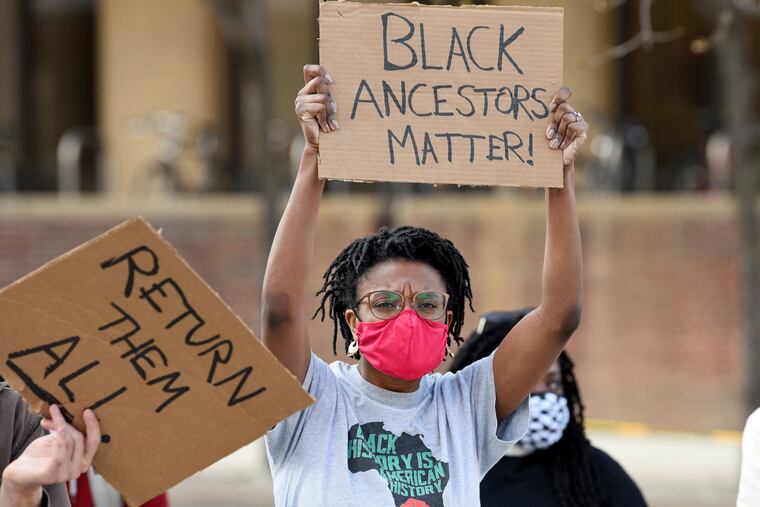As Philly reckons with MOVE remains tragedy, anthropologists must confront our role
It’s time for those of us working in academic and other institutions to reassess our roles, and not just react in performative allyship with those harmed.

While news of the possession and mishandling of remains of two children of the MOVE family is considered abhorrent and shocking to many biological anthropologists, many of us — particularly Black and Indigenous biological anthropologists — were not surprised. This is not because we approve of the use of identified victims’ remains in curation, display, or instruction. We do not. It is unremarkable because the structures that birthed and surround the practice of anthropology have their foundations in racist and colonialist ideologies. And until recently, academia and science have struggled to engage with these histories.
As biological anthropologists we recognize and are grateful for the contributions that research with the remains of past and willed individuals’ (those who have donated their body to science) has provided our understanding of human evolution, health, and history. We are also aware of the important insight forensic examinations can provide in assessing trauma to victims of crime and abuse. These scientific tools, particularly when used by modern biocultural anthropologists, help shed light on inequities, speak for the silenced, and teach us the inconvenient truths of past human choices.
» READ MORE: City of Philadelphia should thoroughly investigate the MOVE remains’ broken chain of custody | Opinion
The events surrounding the mishandling of victims of the bombing of the MOVE family and Philadelphia residents did not do that. Instead they reflect police militarization, racialized violence, breakdown of the chain of custody in the care of victims remains, and privileged indifference. Most importantly, the string of traumatic events that allowed the remains of MOVE family members to not be returned to their loved ones is the sort of violence that continues to be perpetrated on Black people and those from underrepresented groups in American society. Numerous academic and editorial articles describe how early anthropology “othered” and objectified the bodies of non-white peoples, in both life and death.
Despite this legacy, the field has established ethical standards for both academic and applied anthropology (cultural, linguistic, biological, forensic, and archaeological). These provide professional guidelines, and in some cases laws, dictating many of our interactions with the people we work with, living and dead. The most notable are Institutional Review Boards (IRBs), which monitor research with human subjects and issues of informed consent, and The Native American Graves Protection and Repatriation Act (NAGPRA), a federal law that regulates the repatriation and disposition of Native American human remains and other sacred objects. And anthropologists have professional standards of responsible and ethical practice, many of which are currently in discussion across biological anthropology, archaeology, and forensic science.
Nevertheless, these baselines fall short in the handling of human skeletal remains. Institutional Review Boards are often not required for such research. Laws like NAGPRA have varying levels of compliance, made worse by poor funding, inexperience among some technicians, and a small workforce. Additionally, the important ethical practice of engaging with descendant communities is not required in practice, and often not considered.
Add to all of this the further structural breakdowns in academia that lead to ambivalent practices around human remains, including power imbalances between interns, lab workers, students, and leadership, poor funding, and detachment from those who do not typically work with remains. Those who do want to incorporate these practices, often graduate students and junior faculty, lack the resources or time around their other academic responsibilities to meaningfully engage with stakeholders in developing and implementing projects.
Academic environments, even those where ethical and beneficial work with human remains could happen, are structured in ways opposed to ethical engagement, and in some cases encourage abusive behavior (e.g., rewarding expedient and cutting-edge research in favor of efforts that rely on community approval after building trust).
» READ MORE: Philadelphia needs a second MOVE bombing commission | Opinion
Regardless of these inadequacies in common anthropological practice, what happened to remains identified as belonging to Tree and Delisha Africa should not have. There are government establishments that could have intervened, particularly when the victim’s next of kin are known to those in charge of caring for the remains. In the aftermath of the MOVE bombing, that was Philadelphia’s Office of the Medical Examiner. At multiple points throughout the decades, those involved should have raised flags, but their training appears to have fallen wildly short.
The MOVE children should have been fully returned to family after forensic investigation concluded in 1985, going through appropriate repatriation avenues. It is clear that the systems that we who work with human remains operate in — collegiate institutions, museum collections, and forensic science — are inadequate to ensure respectful treatment. Right now is an opportunity for each of these institutions to listen to families, stakeholders, descendants, and researchers engaged in reform. It is time for those of us working in these institutions to reassess our roles within these structures, and not just react in performative allyship with those harmed.
Can our field rebuild trust with traumatized communities? Hopefully, we can.
Tisa Loewen is a bioarchaeologist, PhD candidate at Arizona State University, and founding member of Black in Bioanth, working towards ethical research, dismantling of scientific racism, and representation in biological anthropology.